Jim Hubbard: Veteran of the Month | December 2023
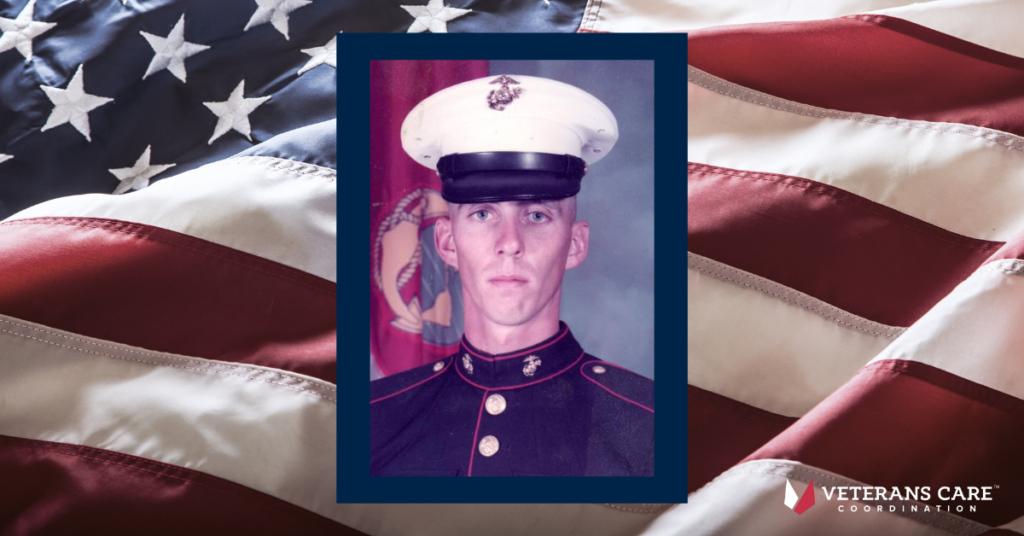 Jim Hubbard was born and raised in north Saint Louis County, the second oldest of three sisters and two brothers. His mother was a homemaker, and his father was a skilled sous chef at Westwood Country Club, who also worked at McDonald Douglas during the Mercury program. The perks of his father’s occupation occasionally translated into leftovers from country club events finding their way home. Hubbard described himself as a typical kid during his formative years. As a teen, he found work as a caddy at the same country club where his father worked. Ultimately, through his job at Westwood Country Club, he secured a scholarship to Mizzou, where he studied economics and history.
Jim Hubbard was born and raised in north Saint Louis County, the second oldest of three sisters and two brothers. His mother was a homemaker, and his father was a skilled sous chef at Westwood Country Club, who also worked at McDonald Douglas during the Mercury program. The perks of his father’s occupation occasionally translated into leftovers from country club events finding their way home. Hubbard described himself as a typical kid during his formative years. As a teen, he found work as a caddy at the same country club where his father worked. Ultimately, through his job at Westwood Country Club, he secured a scholarship to Mizzou, where he studied economics and history.
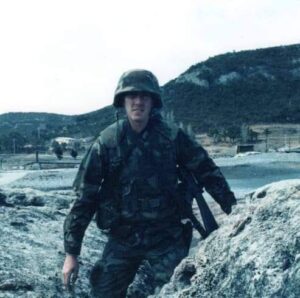
Korea, 1986
After completing his undergraduate degree, Hubbard had a conversation with his grandmother. She asked him if he had considered pursuing a master’s degree. Hubbard admitted that he had thought about it, but he was unsure how he could afford it. So, he decided to speak to his boss about his academic aspirations. Hubbard said, “I went and told my boss that I wanted to go back to school, and he said that was pretty admirable, and the next day, he fired me.” His employer was concerned he couldn’t commit the time needed to acquire his master’s while continuing to work. Hubbard was 26 years old and trying to figure out his next steps in life. He found a solution through a suggestion from his brother, recalling, “I needed to find a way to pay for school, and my brother, who was in the Marine Corps, called me and said, ‘Why don’t you consider joining the Marines because they’ll pay for it.'”
Based on his brother’s suggestion, Hubbard joined the United States Marine Corps in 1985. He had a college degree and considered attending Officer Candidate School (OCS). However, he stated, “The wait for OCS at the time was incredibly long, so I went ahead and enlisted with the option to go through OCS if I so desired.”
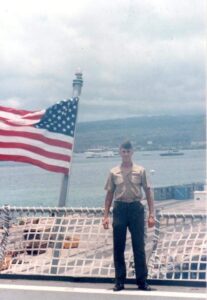
Hawaii, 1986
Hubbard completed 13 weeks of boot camp at Camp Pendleton in San Diego. After his MOS or Military Occupational School, he became an 0411 Integrative Maintenance Management Specialist, which Hubbard explained was “essentially a parts chaser.” He was stationed at Camp Pendleton after MOS but spent most of his time deployed overseas in the Corps, stating, “I did two West Pacs and one around the world cruise where you spend most of your time in the Persian Gulf.” A West Pac is a military abbreviation for a tour in the Western Pacific. During his time in the Corps, Hubbard did two West Pac tours and a Contingency Operation, each six months long.
During his first deployment, he split time on the USS Mobile and then the USS New Orleans. During the first West Pac, Hubbard explained, “We left in January of ’86 and stopped in the Philippines because Marcos was getting booted out of power, and we thought we were going to have to evacuate the embassy if need be and spent a lot of time doing circles off Manilla.” He also went to Korea, Thailand, and Okinawa during his first deployment and explained, “We spent a lot of time in Okinawa doing repairs on vehicles.” Hubbard described, “We were speed bumps if something went wrong; they would send us in first, and we were to establish a beachhead until they could get a bigger force there.” Essentially, in battle, the Marines go in first and hold an area until more forces can arrive.
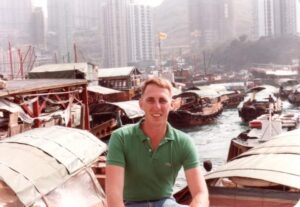
Korea, 1986
During his second deployment on the USS Ogden, Hubbard engaged in operations similar to his first deployment, primarily in Korea and Thailand. Hubbard explained, “We were there in the event that something went down; if they needed a force and readiness out there, that was essentially what we were doing.” The USS Ogden’s troops were poised to respond to unrest in Korea and the Philippines at that time, and there was a heightened sense of security following the recent missile attack on USS Stark in the Persian Gulf. Hubbard stated, “They told us to be ready to go at any time.” Luckily, the local authorities were able to maintain control in most cases. Hubbard’s favorite part of his second deployment was a trip to Australia. He said, “Very friendly people there, and we went to a place where they rarely ever saw American ships; we went to Tasmania.” Hubbard described the area as very rural, often compared to Dublin.
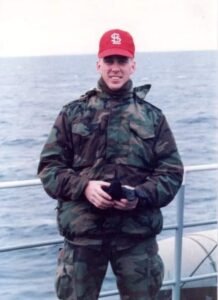
Alaska, 1987
During the USS Ogden’s deployment, the crew bravely navigated through a severe typhoon near the Philippines. Hubbard described, “You don’t want to be in port when one of those things hits. The Ogden had a half flat bottom, so it rocked a lot but not as bad as others that had a completely flat bottom.” The storm lasted almost three weeks, and luckily, Hubbard didn’t suffer from seasickness like many others did.
In July of 1987, after completing his second West Pac, he returned home and began working on his master’s degree. However, he received an emergency call for deployment to the Persian Gulf. Marine forces were required on the ship in case of any unforeseen circumstances. In the fall of the same year, he boarded the USS Okinawa for his third deployment.
After a stop-off in the Philippines from unrest due to guerrilla warfare attacking American units, the ship made its way to the Persian Gulf. Hubbard said, “We were there from Thanksgiving of ’87 till Good Friday of ’88.” Hubbard continued, “I spent plenty of time behind a 50-caliber machine gun in the Persian Gulf.” Hubbard explained, “A 50-caliber machine gun is a crew-serve weapon. You got a gunner and an A gunner. I was behind the machine gun, and then the A gunner, who was a lance corporal, fed the belts on the machine gun. You put a lot of rounds down range. Sweeping back and forth. You try to keep some distance between us and whatever is coming at us, and if they get close, you try to hit it.”
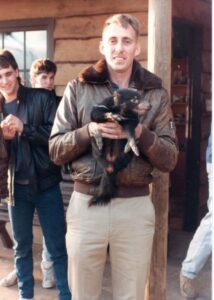
Tasmania, 1987
Hubbard explained how they also participated in safely escorting Kuwaiti tankers for refueling. They would pick up the tankers outside the Gulf in the Arabian Sea, ensure their safe passage to Kuwait, allow them to refuel, and then escort them back out again. Thankfully, all the ships he sailed on managed to avoid any mines or missile attacks.
Upon finishing his third and final tour, he had six months and two weeks left before his honorable discharge from the Marines. Despite encountering a close call that nearly resulted in another tour, he was fortunate to receive the support of a gunnery sergeant who managed to keep him on the base.
After serving honorably, he returned to his roots in the St. Louis area and pursued his education. Hubbard worked on a golf course for a while and completed his master’s degree in business administration. He continued to work in the logistics field in the private sector, specifically in supply chain management. He got married in 1994 and remained married for 15 years. Despite enjoying his time in California, he admitted that it was too expensive to stay there. Hubbard stated, “I had a lot of good times out there and had a lot of good friends in the Marine Corps.” He remains connected with friends he made in the Marine Corps, which is a testament to the strong bonds forged in the military.
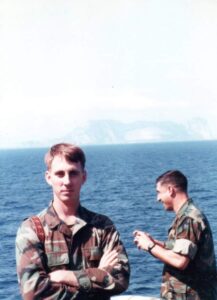
Straits of Gibraltar, 1988
Hubbard is still employed and enjoys spending his free time doing volunteer work. He is associated with the Focus Marines Foundation, which helps Iraq and Afghanistan Veterans get their lives back on track and assimilate back into civilian life. Additionally, he actively works with Stray Paws Rescue, where he fosters dogs in his home, transports animals, and takes care of them nightly at their location. Hubbard stated, “You see the best of people doing stuff like this, and you see the worst of people.”
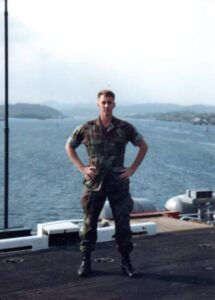
Panama, 1988
During his time in the military, Hubbard identified two key takeaways: the importance of being an active team member and having confidence in one’s abilities. He pursued the fields of accounting and finance while searching for his MOS, but in the Marine Corps, it is Rifleman first. This quote, spoken by Gen. Alfred M. Gray, 29th Commandant of the Marine Corps, says, “Every Marine is, first and foremost, a Rifleman. All other conditions are secondary.”
His story is a powerful reminder that each person can make a significant impact on the world. We can all aim to emulate Hubbard’s selflessness and dedication to his country, and his ongoing volunteer work can inspire us to make positive contributions to our communities and beyond.
Veterans Care Coordination is proud to recognize Jim Hubbard for his service to our country. We are privileged to have the opportunity to share the stories of our nation’s heroes. Thank you for your service, Jim.
